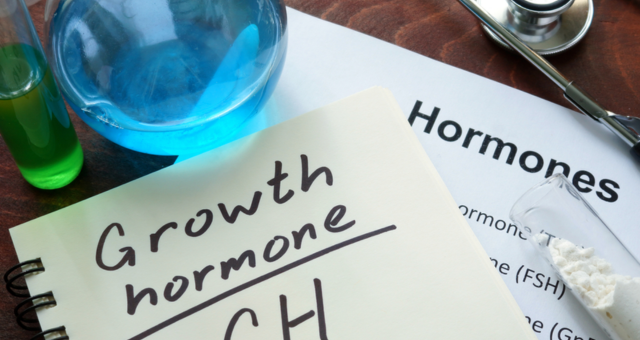Medically Reviewed by Lucas Rosa, PhD in Molecular Biology
Human Growth Hormone, or HGH, is a powerful hormone that plays a pivotal role in your metabolic health and well-being.
What Is Human Growth Hormone?
Produced by the pituitary gland, an almond-sized gland at the base of your brain, HGH is often called the “youth hormone”. It’s responsible for growth in childhood, but it continues to be important throughout adulthood by helping regulate metabolism, support muscle and bone strength, and even influence mood and sleep. (1)
Think of it like your body’s internal builder. HGH tells your body when to grow, heal, and rebuild tissue – whether it’s your skin, muscles, or bones.
What Does Human Growth Hormone Do?
The role of human growth hormone extends far beyond just helping kids grow taller. Here’s what it does in people of all ages: (2)
- Supports Growth and Development: In children and teens, HGH helps bones and muscles grow. That’s why kids with low HGH levels might be shorter or grow more slowly.
- Maintains Healthy Muscle and Bone Mass: In adults, HGH helps you maintain lean muscle, stronger bones, and a healthy fat distribution.
- Regulates Metabolism: HGH plays a primary role in determining how your body will use macronutrients (carbohydrates, fats, and proteins) for energy. It’s key in keeping your metabolism running efficiently.
- Promotes Healing and Recovery: HGH speeds up cell regeneration and repair. That means quicker healing after workouts, injuries, or illnesses.
- Affects Mood and Sleep: Healthy HGH levels are linked to better sleep quality and mood balance. It’s part of the reason you feel refreshed and energized after a good night’s sleep.

The Production of Human Growth Hormone
HGH is made in the pituitary gland, a tiny but mighty part of your brain. This gland produces and releases HGH in pulses, especially during sleep and after exercise. The production of HGH is regulated by two other hormones from the hypothalamus:
- GHRH (Growth Hormone-Releasing Hormone) – which stimulates the release of HGH.
- Somatostatin – which inhibits its release.
Together, these keep your HGH levels in check based on your body’s needs.
Signs HGH Might Be Out of Balance
Like any hormone, having too little or too much HGH can throw off your body’s balance. Here are some signs of low HGH in adults: (3)
- Decreased Muscle Mass or Strength
- Increased Belly Fat
- Fatigue or Low Energy
- Poor Sleep
- Mood Changes, like irritability or mild depression
- Slow Healing from injury
Too much HGH, on the other hand—often due to a rare tumor—can cause joint pain, enlarged hands/feet, and even diabetes-related symptoms.
Natural Ways To Keep HGH Balanced
Now here’s the good news: You don’t need injections or extreme supplements to support your body’s HGH production. Here are some natural, science-backed ways to maintain healthy HGH levels:
1. Prioritize Deep Sleep
Your body produces the highest amount of human growth hormone while you sleep, particularly during deep, slow-wave sleep. That means skimping on rest can hurt your HGH production. Here are some tips to improve your sleep. (4)
- Sleep in a dark room
- Strictly follow a regular sleep schedule
- No use of screens an hour before bed
- Avoid heavy meals late at night

2. Get Regular High-Intensity Exercise
Exercise is one of the most powerful natural HGH boosters. Especially high-intensity interval training (HIIT) and resistance training (like weight lifting).
Studies show that these types of workouts can significantly increase your HGH levels, sometimes up to 5 times more than resting levels.
3. Maintain a Healthy Weight
Carrying excess belly fat, especially visceral fat, can lower your natural HGH production. Losing weight, especially through regular exercise and a balanced diet, helps normalize these levels.
4. Don’t Eat Before Bed
Insulin and HGH don’t work well together. Eating sugary or high-carb meals right before bed spikes your insulin and reduces HGH production during sleep.
- Solution: Finish your last meal 2–3 hours before bedtime, and keep it balanced with protein, healthy fats, and fiber.
5. Try Intermittent Fasting
Intermittent fasting has been shown to naturally increase HGH levels – sometimes by up to 300% or more. Fasting lowers insulin levels, which creates a better environment for HGH to rise.
Some of the popular intermittent fasting methods include the 5:2 (follow a normal diet plan for 5 days, limit calories for 2 days) and 16:8 method (observe strict fasting for 16 hours, followed by caloric-deficit eating during an 8-hour window). (5)
6. Reduce Stress
Chronic stress raises cortisol, a hormone that can suppress HGH production. Mindfulness, yoga, breathing exercises, and journaling are great ways to reduce stress and support hormonal balance.
7. Fuel Your Body with the Right Nutrients
Some nutrients help your body make and release more HGH:
- Arginine – an amino acid found in nuts, seeds, turkey, and eggs
- Glutamine – found in spinach, beans, and cabbage
- GABA – found in brown rice, green tea, broccoli, and kimchi
- Vitamin D – found in egg yolk, salmon, tuna, and sunlight
- Zinc – found in red meat, poultry, shellfish, and nuts
Should You Supplement With HGH?
For most people, natural methods are the safest and most effective way to support HGH. Synthetic HGH is only legally prescribed for specific medical conditions like growth hormone deficiency or certain muscle-wasting diseases.
Misusing HGH (such as for athletic enhancement or anti-aging purposes) can cause serious side effects including joint pain, high blood sugar, and heart problems.
So unless your doctor says otherwise, stick with natural strategies.

Conclusion
Human growth hormone (HGH) is much more than a “growth” hormone – it’s a major player in how your body repairs itself, builds lean muscle, burns fat, supports metabolism, and maintains youthful energy levels.
Produced in the pituitary gland, HGH levels naturally rise during deep sleep and intense exercise, especially resistance and high-intensity interval training. As we age, HGH production slows, but the good news is that you can increase it naturally.
Simple daily choices – like getting enough deep sleep, managing stress, doing regular strength training, avoiding excess sugar, and fueling your body with protein-rich, nutrient-dense foods – can help maintain healthy HGH levels without the need for synthetic injections.
By taking care of your body and mind, you support a natural hormonal balance that helps you feel stronger, recover faster, and stay energized longer.
References
- Brinkman, Joshua E., and Sandeep Sharma. “Physiology, Growth Hormone.” PubMed, StatPearls Publishing, 1 May 2023, www.ncbi.nlm.nih.gov/books/NBK482141/.
- Olarescu NC, Gunawardane K, Hanson TK, et al. Normal Physiology of Growth Hormone in Normal Adults. [Updated 2025 Apr 18]. In: Feingold KR, Ahmed SF, Anawalt B, et al., editors. Endotext [Internet]. South Dartmouth (MA): MDText.com, Inc.; 2000-. Available from: https://www.ncbi.nlm.nih.gov/books/NBK279056/.
- Feldt-Rasmussen U, Klose M. Adult Growth Hormone Deficiency- Clinical Management. [Updated 2022 May 23]. In: Feingold KR, Ahmed SF, Anawalt B, et al., editors. Endotext [Internet]. South Dartmouth (MA): MDText.com, Inc.; 2000-. Available from: https://www.ncbi.nlm.nih.gov/books/NBK425701/.
- Van Cauter E, Plat L. Physiology of growth hormone secretion during sleep. J Pediatr. 1996 May;128(5 Pt 2):S32-7. doi: 10.1016/s0022-3476(96)70008-2. PMID: 8627466. https://pubmed.ncbi.nlm.nih.gov/8627466/.
- Ho KY, Veldhuis JD, Johnson ML, Furlanetto R, Evans WS, Alberti KG, Thorner MO. Fasting enhances growth hormone secretion and amplifies the complex rhythms of growth hormone secretion in man. J Clin Invest. 1988 Apr;81(4):968-75. doi: 10.1172/JCI113450. PMID: 3127426; PMCID: PMC329619. https://pmc.ncbi.nlm.nih.gov/articles/PMC329619/.
Check Out
HF Swaps
Better products for better hormone health.









